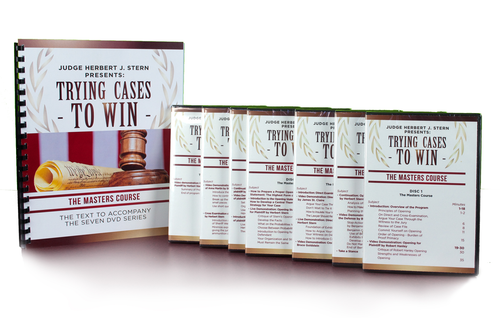Advanced Course
This exceptional presentation creates a concisely powerful, practice-specific six-hour "masterpiece" on effective trial strategies. A case file is included for you to review prior to viewing the video.
We recommend these volumes as supplements for those who have already mastered the basic programs and who wish to refresh and then advance their skills.
See an excerpt below the description from: Trying Cases to Win, The Advanced Course that discusses how to achieve repetition.
Key Points Covered:
- Identifying the most important segment of the trial
- Make the opening argument for your case without arguing
- The importance of projecting your own belief into the case
- What the jurors always believe about the attorney
- Four ways to construct the opening statement -- which is best and why
- Four levels of advocacy -- which level are you operating on? How to move up
- Three words you must never say
- The secret of knowing which points to ask... and more!
Highlights:
This exceptional presentation creates a concisely powerful, practice-specific six-hour “masterpiece” on effective trial strategies. A case file is included for you to review prior to viewing the DVD.
We recommend these volumes as supplements for those who have already mastered the basic programs and who wish to refresh and then advance their skills.
Detailed Course Outline
DISK 1
- Principles of opening statement
- Opening is argument
- Improper arguments in opening
- Ethos - personal statement of belief
- Using words of facilitation
- Using rationalization and denial as your tools
- Bigger the need the stronger your statements
- Overcoming the jury's suspicion of you
- Misuses of "my client"
- Vouching for your case
- Construction of opening statement (argument)
- Burdens of proof are worthless in openings
- Four ways to construct and opening
- Chronological - bad
- Witness-by-witness - bad
- Telling a story
- The right way
- How to begin - no wind-up
- Begin by "bombing" the adversary
- Organize around your power points
- Where to stand during an opening
- How long to take
- Never defend a case - always prosecute
- Always just one case - no matter how many parties
- Your theory must cover all the facts
- Highest level of advocacy: draft a theory that rests on all the facts
- Four levels of advocacy
- Contradicting facts - insanity
- Ignoring facts - foolishness
- Admitting bad facts - journeyman
- Makeing bad into good - the master's game
- Fluid Positions undermine credibility
- Never say "but even if . . "
- Accumulation weakens your case
- Constructing the Stein case theory
DISK 2
- Demonstration of opening for prosecution
- Use of podium
- Unimportant details reduce impact
- Penalty for violation the "rule of probability"
- Demonstration of opening for prosecution by Stern
- Demonstration of opening for the defense
- Importance of speaking first
- Direct Examination
- Purpose of direct is to argue your case to the jury and achive the "Wimbledon Effect"
- The four tasks of direct examination
- Common errors of direct examination
- Long narrative answers
- Written questions
- How to form questions on direct
- How to prepare the direct
- Transition questions
DISK 3
- How to lead without leading
- Break testimony into small, digestible pieces
- How to achieve repetition
- Demonstration of direct examination
- Cross-examination
- Purpose, to sum up not to question
- Three techniques of cross-examination
- To Impeach
- To limit
- To get help
- Do not over-control witnesses on cross-examination
- How to deal with the volunteering witness
- Demonstration of cross-examination
Viewing Time: 6 hours




